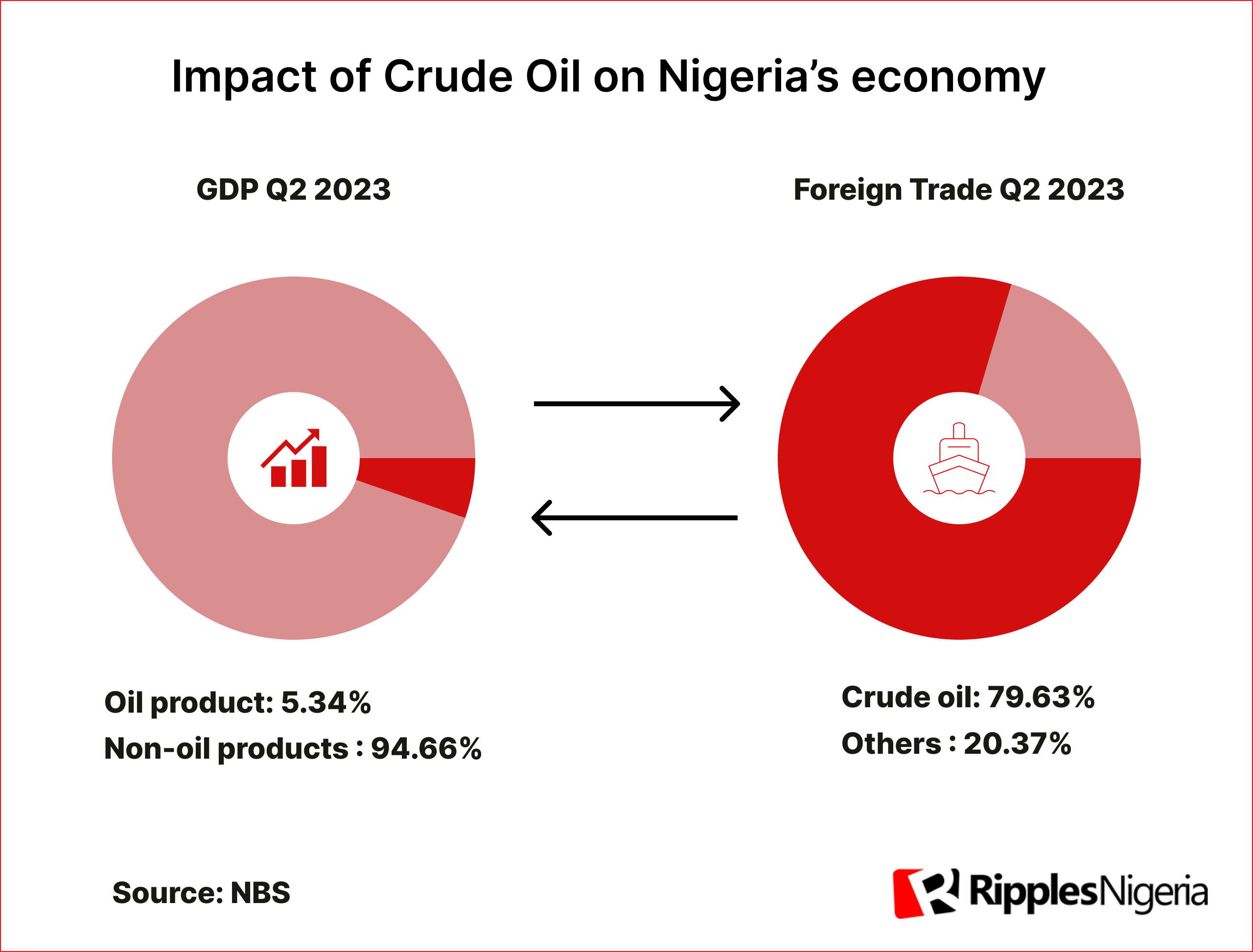Ripples Metrics
RipplesMetrics: Crude oil grows on export, contributes less to Nigeria’s economy

Two reports by the National Bureau of Statistics (NBS) have shown how Nigeria’s crude oil, despite contributing a larger percentage in trade merchandise, contributes very little to the country’s economic growth.
RipplesMetrics examined the 2023 second quarter reports on Foreign Trade and Gross Domestic Product, both published by the data bureau.
According to NBS, Nigeria’s total foreign trade stood at N12.7 billion in Q2 2023. The exports jumped up by 8.15 per cent to N7.02 billion, while imported goods increased by 2.99 per cent to N5.6 billion.
On the other hand, the country’s GDP slightly rose to 2.51 per cent from 2.31 recorded in the first quarter of 2023. The report said that the Nominal GDP was N52.1 trillion while Real GDP was N17.72 trillion
The performance may not be unconnected to policies enacted by President Bola Tinubu and its impact on the economy. Some analysts have also concluded that the country’s economy might still be finding it hard to adjust to these policies, hence the impact would be felt majorly in trade and transportation.
These impacts have been captured by RipplesMetrics in several reports on the economy, inflation rate and cost of transportation. Recently, the president highlighted his agenda for economic growth, but data showed the scary numbers behind the proposed agenda.
However, this report looks into the development of crude oil production in exporting and its contribution to the economy.
READ ALSO:RipplesMetrics… 100 DAYS: Highlighting the data across Tinubu’s 8-point agenda
Nigeria, being one of the largest oil and gas producers in Africa, began exploration as far back as 1903. The country generates most of its revenue from transactions around crude oil but corruption and theft within the sector has dwindled the income. There are also issues on how the exploration is causing environmental disruptions in the Niger Delta region and the poor state of the country’s refineries.
This, over the years, has made Nigeria export crude oil to other countries with refineries and import the finished products to be sold in the country. For many years, Nigeria had always subsidised the amount paid on products like petrol sold at pump stations.
The Nigeria Extractive Industries Transparency Initiative said that between 2005 and 2023, the country spent N21.7 trillion on fuel subsidy. Another disclosure from Nigeria National Petroleum Company Limited, this year, said that N400 billion was being spent monthly on subsidy. However, at the assumption of President Tinubu, the government decided to halt fuel subsidy.
RipplesMetrics checks through the NBS report showed that Oil contributed just 5.34 per cent to the country’s GDP in the second quarter of 2023 and 6.21 per cent in the first quarter of 2023.
Further checks revealed that despite an average production rate of 2.05 to 1.22 million barrels per day between 2016 and Q2 2023, the contribution to GDP growth has not risen above 10 per cent.
The report said, “The real growth of the oil sector was –13.43 per cent (year-on-year) in Q2 2023, indicating a decrease of 1.66 per cent points relative to the rate recorded in the corresponding quarter of 2022 (-11.77 per cent). Growth also decreased by 9.22 per cent points when compared to Q1 2023 which was –4.21 per cent. On a quarter-on-quarter basis, the oil sector recorded a growth rate of -14.12 per cent in Q2 2023.”
Meanwhile non-oil products (like agricultural, production, ICT) contributed more than 90 per cent to Nigeria’s GDP.
On the contrary, according to Foreign Trade data, the value of crude oil exported to other countries stood at N5.59 million in the second quarter of 2023. This contributes 79.63 per cent to exported trade carried out within the three months.
Further findings showed that crude oil was exported most to Europe at a value cost of N2.64 million. It was followed by Asia and America with a value of N1.2 million and N1.12 million, While Africa was the lowest with a value of N613,612.59.
According to this data, while crude oil exports top the country’s trading, the revenue contribution to the fiscal economy is very low. The data shows how imperative it is for the country to manage crude oil resources such that revenue from the sector increases.
Recently, the Speaker of the House of Representatives, Tajudeen Abbas, said that Nigeria lost N16.25 trillion to crude oil theft between 2009 and 2020. This development contributes to the struggle the country experiences in meeting the globally expected daily production quota, hence impacting economic growth.
This, however, has made experts recommend that the government focus on non-oil products as the source of revenue generation rather than oil production.
By James Odunayo
Join the conversation
Support Ripples Nigeria, hold up solutions journalism
Balanced, fearless journalism driven by data comes at huge financial costs.
As a media platform, we hold leadership accountable and will not trade the right to press freedom and free speech for a piece of cake.
If you like what we do, and are ready to uphold solutions journalism, kindly donate to the Ripples Nigeria cause.
Your support would help to ensure that citizens and institutions continue to have free access to credible and reliable information for societal development.






















